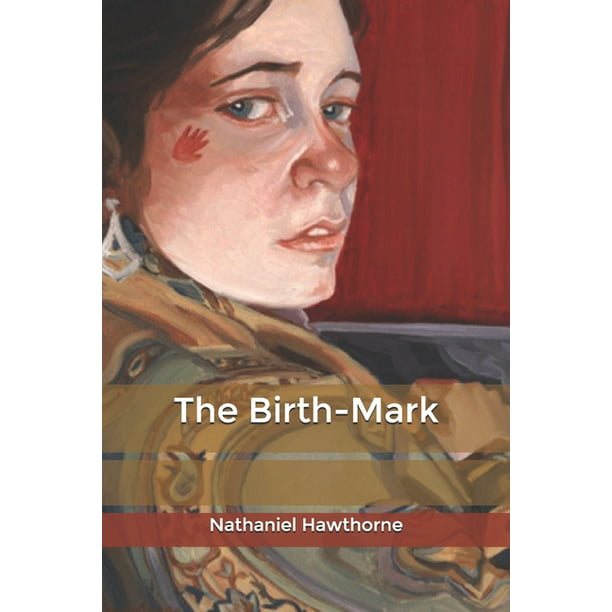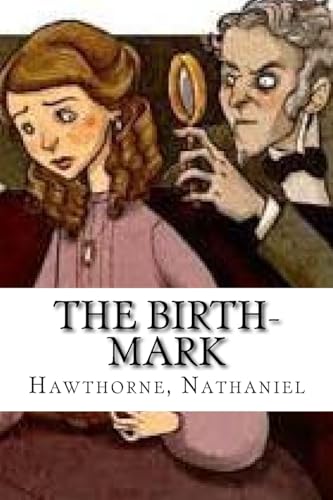Review of "The Birthmark" by Nathaniel Hawthorne
Nathaniel Hawthorne is a staple of American Literature with his most famous work, "The Scarlet Letter." I have not read that book, nor have I read anything from Hawthorne. So, going into this short story, I had no idea what writing style I would be getting. "The Birthmark" fits in well with other works of its time. It was published in the 1840s and deals with the dark side of science, similar to Mary Shelley's "Frankenstein." There are even some parallels between the two stories—the manipulation of life as well as servants. The main character Alymer has a disheveled manservant that helps him with experiments calling him "master." Reminiscent of Dr. Frankenstein's servant Igor. Aminadab calls out that they should never remove the birthmark. Aminadab is described as physically grotesque, yet his heart proves to be better than Alymer, saying that Georgiana is perfect the way she is, with the birthmark.
This story is about Alymer, a man of science, and
his wife, Georgiana, who has a birthmark on her cheek. Alymer calls
his wife perfect except for her birthmark. It is described as a tiny
red hand. Past lovers tell her it results from a fairy touching her
as a baby, implanting particular charms and magic. At first, she
thinks that it is a charm. The story asks the question to the reader,
is it a beauty mark or a defect? Aylmer becomes obsessed with the
birthmark, finding it hideous. His repulsion drives a wedge in his
marriage, and Georgiana becomes uncomfortable with the way her
husband looks at her. Eventually, she gives in and asks to get the
mark removed. Alymer is an arrogant scientist who thinks he can get
rid of the birthmark and do better than nature; he plays "god."
Aylmer has aspirations of creating an elixir of life. "Aylmer's
somber imagination was not long in rendering the birthmark a
frightful object, causing him more trouble and horror than ever
Georgiana's beauty, whether of soul or sense, had given him
delight."
While this story revolves around a shallow feature, the story is not about the birthmark but Alymer and his issues with perfection and using science to perfect the world around him. Like Dr. Frankenstein, Alymer wishes to "play god" by wanting to create an immortality elixir. His arrogance outweighs his failures, and he is blinded by his ambition to remove the birthmark and create his perfect woman. The notion of perfection becomes a philosophical debate, and sometimes the story becomes too arduous to read.
While Georgiana agrees to have Alymer remove the birthmark, she does it for his happiness, not hers. When this story was written, women were seen as just "the wife" and had no life or ambitions of their own. At least, that is how they were portrayed, so it is not surprising here to see Georgiana risk her life for something so shallow and minuscule. However, it still is hard to read. Even after she knows her husband's experiments fail, she still trusts him with her life and takes the risk of possibly dying at the cost of removing the birthmark. Reading this now in 2020, it seems ridiculous to think a woman would risk dying to remove a minor blemish because her husband does not think she is perfect enough. Even though Georgiana is a poorly written character, which I think is the point, Alymer comes out looking like a terrible person. Hawthorne does not condone Aylmer's actions and thoughts, but he does explore them in a way that allows the audience to understand Aylmer. The decision to have the wife die in the end, I think, was to show that Aylmer was wrong to try and perfect his wife's appearance.
"The Birthmark" is not a story that I particularly enjoyed reading, partially because of Hawthorne's writing style and partly because I found the subject matter uncomfortable and unrelatable. However, I did find one quote that I thought was beautiful was. "So she poured out the liquid music of her voice to quench the thirst of his spirit." It is an excellent metaphor for her singing to Alymer and explains why he might have loved her beyond her birthmark. Knowing that then makes it tragic that he could not overcome the birthmark and love her the way she is, how Aminadab sees her. This story shines a light on the relationships from how we see ourselves, how we see others, and how we think others see us. Flaws can be found everywhere if you look hard enough, but we must have the humility to see the flaws within ourselves. Something that Aylmer fails to do.
A lot of older works contain words that aren't used often in today's society, at least not by most commoners. So, here is a list of words that you may not know the definitions of, at least I didn't.
Fastidious- Showing or demanding excessive delicacy or care. Reflecting a meticulous, sensitive, or demanding attitude.
Votary- A devoted admirer, a devout or zealous worshipper or a staunch believer or advocate.
Ardent- Characterized by warmth of feeling typically expressed in eager, zealous support or activity
Congenial- Agreeably suited to one's nature, tastes, or outlook
Ineffaceably- Not effaceable.
Efface- To eliminate or make indistinct by or as if by wearing away a surface. to cause to vanish.
Recondite- Difficult or impossible for one of ordinary understanding or knowledge to comprehend. of, relating to, or dealing with something little known or obscure.
Remonstrance- An earnest presentation of reasons for opposition or grievance. A document formally stating such points.
Works Cited
http://www.online-literature.com/hawthorne/125/
“Votary.” Merriam-Webster.com Dictionary, Merriam-Webster, https://www.merriam-webster.com/dictionary/votary. Accessed 2 Sep. 2021.
“Fastidious.” Merriam-Webster.com Dictionary, Merriam-Webster, https://www.merriam-webster.com/dictionary/fastidious. Accessed 2 Sep. 2021.
“Ardent.” Merriam-Webster.com Dictionary, Merriam-Webster, https://www.merriam-webster.com/dictionary/ardent. Accessed 2 Sep. 2021.
“Congenial.” Merriam-Webster.com Dictionary, Merriam-Webster, https://www.merriam-webster.com/dictionary/congenial. Accessed 2 Sep. 2021.
“Ineffaceable.” Merriam-Webster.com Dictionary, Merriam-Webster, https://www.merriam-webster.com/dictionary/ineffaceable. Accessed 2 Sep. 2021.
“Efface.” Merriam-Webster.com Dictionary, Merriam-Webster, https://www.merriam-webster.com/dictionary/efface. Accessed 2 Sep. 2021.
“Recondite.” Merriam-Webster.com Dictionary, Merriam-Webster, https://www.merriam-webster.com/dictionary/recondite. Accessed 2 Sep. 2021.
“Remonstrance.” Merriam-Webster.com Dictionary, Merriam-Webster, https://www.merriam-webster.com/dictionary/remonstrance. Accessed 2 Sep. 2021.




No comments:
Post a Comment